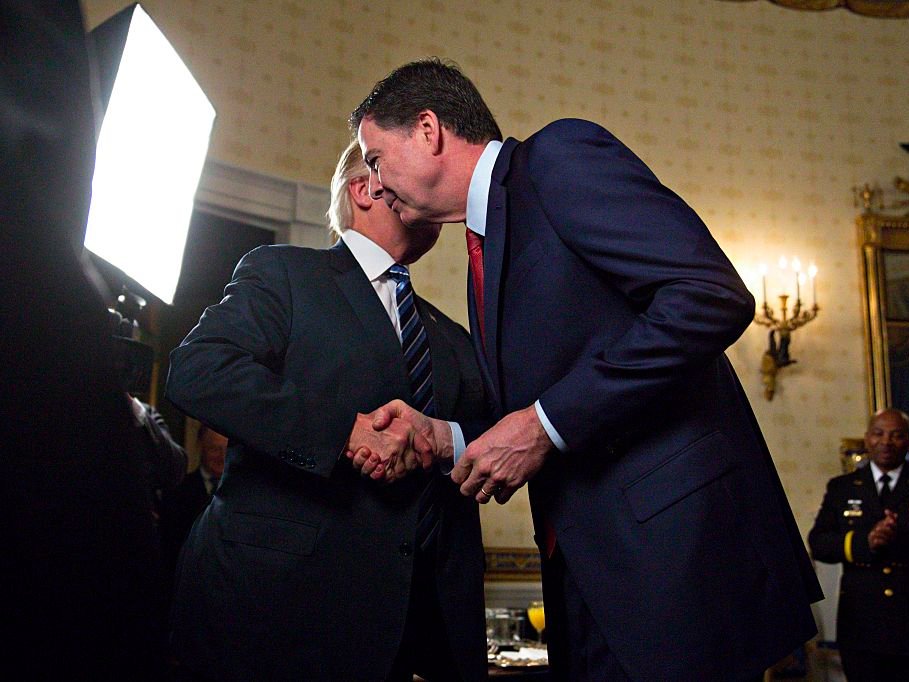 U.S. President Donald Trump (L) shakes hands with James Comey, director of the Federal Bureau of Investigation (FBI), during an Inaugural Law Enforcement Officers and First Responders Reception in the Blue Room of the White House.Andrew Harrer-Pool/Getty Images
U.S. President Donald Trump (L) shakes hands with James Comey, director of the Federal Bureau of Investigation (FBI), during an Inaugural Law Enforcement Officers and First Responders Reception in the Blue Room of the White House.Andrew Harrer-Pool/Getty Images
If there’s been one consistent theme in Donald Trump’s roller coaster presidency, it’s a deep desire for loosely-defined “loyalty” from those he appoints to positions of power.
That’s a terrible thing for the Federal Reserve’s vaunted political independence, especially since the early retirement of vice chairman Stanley Fischer puts Trump in the unprecedented position of naming five of the seven sitting Fed board governors, which plays a preeminent role in setting interest rates and regulating Wall Street with the help of 12 regional banks.
Adam Posen, a former policymaker at the Bank of England and president of the Peterson Institute for International Economics (where I used to work), is worried about a return to disco days of 1970s-style pressure from politicians on Fed policymakers.
“My concern and forecast is that whomever the president appoints as chair, and as vice chair for monetary policy, will be the second coming of Arthur Burns — unless he reappoints Janet Yellen,” Posen told Business Insider in an email interview.
“This will be through the same dynamic as was true for Nixon Administration pressuring, flattering, and bullying Burns, perhaps even more so. Trump will not appoint someone who isn’t subject to this kind of pressure — aka is ‘loyal.'”
Just how much this matters to Trump seems clear in a Wall Street Journal report that Gary Cohn, the head of the National Economic Council, the former president of Goldman Sachs, and, until recently, the leading candidate to replace Yellen at the Fed’s helm, is no longer under serious consideration for the prestigious post.
The reason? Cohn, who is Jewish and was forced to stand next to Trump as the president failed to strongly condemn neo-Nazis following the violence in Charlottesville, Virginia, gave an interview to the Financial Times, two weeks later, in which he lightly and indirectly rebuked the president by simply affirming there should be no equivalence between white supremacist thugs and those protesting them.
If that was enough to put Cohn on Trump’s blacklist, imagine how he’ll treat his actual appointee to Fed chair.
“He wants someone at the Fed where he can call them and say ‘I want you to do A, B and C,'” said Austan Goolsbee, University of Chicago economist and former top economic advisor to President Barack Obama, in an interview with CNBC.
So what would Trumpian pressure actually mean for interest rates? The president once bragged about loving low interest rates because he is the “king of debt,” so it’s not hard to guess. He has also laid out a highly-unrealistic growth target of 4%, later quietly downgraded to 3%, so there’s no way rates are going substantially higher under a Trump-controlled Fed.
Trump’s picks “will be aggressively dovish in terms of keeping rates low, and even if they have previously talked tough about ‘rules’ and the need for the Fed to raise rates,” Posen said.
“For the next couple of years, this isn’t a bad outcome in terms of monetary policy setting, since the risks of runaway inflation are low – even if the Fed falls behind the curve – and the argument for overshooting the inflation target for a while has good justification,” he added.
Indeed, while the unemployment rate has fallen to a historically low rate of 4.4%, underemployment remains widespread, reflected in the absence of wage growth and broader inflation, which continues to fall well short of the central bank’s 2% target.
“That is accident, not Trump design, but lucky for all of us,” says Posen.
Still, the risks further into the future are rather bleak.
“The danger is that if there is a problem in either direction, but worse if we have a recessionary shock while still close to zero interest rates, the non-interventionist biases of any likely Trump appointees will lead to a sub-optimal or insufficient response — reluctance to move rates fast, to expand balance sheet again, to use lender of last resort capabilities,” Posen said.
“This danger will be made worse if the Republican majority in Congress, with some support from some left wing Democrats, continue to limit the Fed’s ability to intervene in markets. The deregulation push on banking combined with some sop to anti-Fed populism may well produce this result.”













